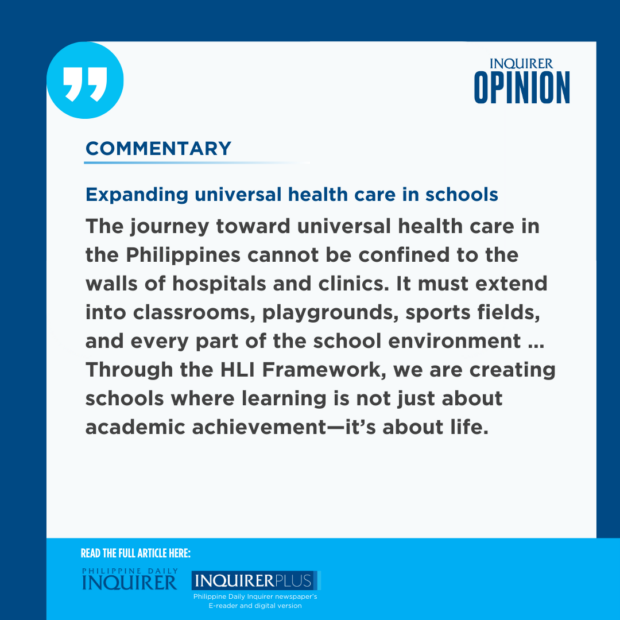
The health of our nation is shaped not only in health facilities but also in the environments where we live, learn, and grow. Schools, where Filipino youth spend much of their childhood, are more than places for academic learning—they are vital settings for cultivating lifelong health and well-being. Schools play a critical role in shaping not just the health of our youth, but their overall well-being.
Education and health are deeply interconnected. Studies show that individuals with higher educational attainment tend to lead healthier lives. However, health-promoting behaviors are shaped by more than just academic knowledge—they are influenced by the environments students inhabit, the relationships they build, and the support they receive.
In the Philippines, challenges such as teenage pregnancy, mental health problems, and substance abuse continue to disproportionately affect young people. These are not simply matters of personal choice; they are shaped by the environments where students grow up, study, and socialize. Schools play a pivotal role in shaping these environments. Behavior change, however, cannot be achieved through information alone. It requires creating nurturing environments where making healthy decisions becomes natural and easier, if not default.
Healthy Learning Institutions: A holistic approach to student development. The Healthy Learning Institutions (HLI) Framework envisions schools as environments that promote not only academic success but also holistic development. Aligned with the World Health Organization’s Health Promoting Schools model, the HLI Framework is built on six core pillars: (1) policies supporting health promotion, (2) safe and healthy environments, (3) supportive social surroundings, (4) health education embedded in the curriculum, (5) accessible health services, and (6) engagement with families and communities.
These pillars create environments where students thrive, fostering physical, mental, and social well-being. Beyond health, school sports and youth formation programs cultivate discipline, leadership, and teamwork, developing well-rounded individuals.
Health cannot be treated as an isolated service in schools. It must be embedded in the core of the education system. Under the HLI Framework, health promotion is not an add-on but is woven into the curriculum, ensuring that learners develop essential life skills—from managing their mental and physical health to navigating relationships and making informed decisions about their well-being.
As of 2024, over 1,554 schools—many in underserved communities—have adopted the HLI Framework, ensuring integrated health promotion and holistic development for their students. To support this, 94 nurses have been hired to address the shortage of health professionals in schools, especially in areas with limited access to health services. Expanding this effort will help meet the needs of learners while providing opportunities for homegrown nurses.
The HLI Program’s impact extends beyond health services. Its integration of school sports and co-curricular activities helps students develop healthy habits, leadership, and resilience—skills that will benefit them long after they leave school.
The promise of healthier, more well-rounded futures. The potential impact of the HLI Framework goes beyond health. By investing in healthy schools, we are shaping healthier, more well-rounded individuals, families, and communities. When students learn healthy behaviors and life skills early, they carry them for life. Schools are not only shaping students academically, they are shaping the future of our nation.
The journey toward Universal Health Care in the Philippines cannot be confined within the walls of hospitals and clinics. It must extend into classrooms, playgrounds, sports fields, and every part of the school environment. By embedding health, well-being, and holistic development throughout the learner’s journey, we are building a foundation for healthier, more resilient communities. Through the HLI Framework, we are creating schools where learning is not just about academic achievement—it’s about life.
By nurturing the health, resilience, and growth of our youth, we are shaping a stronger, more vibrant future for our nation. This is not just about reaching for the promise of universal health care—it’s about making that promise real, lived, and felt in every classroom, playground, and community. A future where each Filipino child thrives isn’t an aspiration; it’s a commitment we make today, in the places where they learn and grow.
—————-
Dr. Miguel Angelo S. Mantaring, MD, MPM, is Director IV of the Bureau of Learner Support Services at the Department of Education. He is also an active participant in consultations and technical working groups of the Second Congressional Commission on Education (EdCom II), for the priority area on safe learning institutions.

